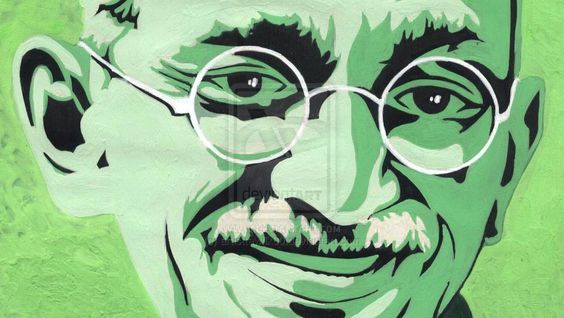Must I begin this defence by quoting the famous Johnson’s[1] adage— that praises are without reason lavished on the dead, and that the honours due only to excellence are paid to antiquity? But India works differently. Here, usually, praises are placed upon the doubtful laps of contemporaries and antiquity, except for Indus valley, is always held with a doubtful glare of subjectivity. Today, the man we are about to dissect shares a unique position in someone’s heart and in many a heartless pocket. This man, once a Mahatma, now shares a synonymous pedestal with that essence of Indianness, the effervescence of which only comes alive within us on certain designated days to celebrate what we are all born with, and are so afraid to imbibe. Therefore, in this culture of congeniality, where man and woman have now become free, to choose, in an eclectic style, their own moral consciousness, and the morality of east and west; where congenial moral concepts are adopted and slightly-tougher-to-maintain discarded as a grotesque imagination of an antediluvian asceticism—evaluating Gandhi and presenting his unbridled admiration for India and it’s Indianness is an exercise in futility, for no matter how much we devour books on him or spent hours debating about his relevance, invoking Gandhi within us, now, will always remain a far-fetched reality, but, this necessarily does not mean that the whole man, suddenly, has become effete for today’s generation. In fact, this is the true genius of great individual who are always held in doubt; adopting them completely would mean that you are as well stepping into the well of future doubtfulness, and adopting a fewer set of sincere ideas of those men would make you a reckoning reasoning man who chose to be a great man not by replicating another, but in his own personal, and sometimes, inimitable style.

Therefore, while reading Gandhi, one cannot but miss the development of a saint as a young man. And, this development does not last only in his formative years, but much later in life, leading him from one set of ideas into another, and in some cases, consolidating his faith in an idea so firmly, that bringing him out from the place had almost become an excruciatingly challenging task. But this development, if noticed sincerely, is a true impetus for our own personal growth and maturation.
The only way Gandhi distinguished himself as a child was by being the coveted ‘Boy’ child in his house. Apart from that, he gave no other reason for his ménage to look at him differently. Wrapped in his own ineffectiveness as a student and in jealously towards his wife, and as well, assisted with athletic impotency but ignoble sexual appetite; Gandhi, as a child, was like any other child and if there was to be any distinction, it would not have ended up in an appreciative part. Still, the way the man developed through times, inspired by men like Raichandbhai and Pranjivan Mehta, books by Ruskin and Tolstoy, philosophies like Gita and Bible, and places like Pietermaritzburg and the Vegetarian society, is a clear distinction of a man with a mind gullible, but, also with the power of stretching that gullibility in favor of developing his understanding of the world and also to be inspired by all worth inspiring from. This quality of him, for I believe, we all must imbibe.
In fact, the best example of his ever morphing mind is not of his decision to withdraw himself from Samaldas College, and instead, go to London for pursuing barrister; an idea given to him by shrewd brahmin Mavji Dave which in turn ‘completely possessed him’, but, the way G.K Chesterton’s 1909 column in Illustrated London News exalted and consolidated his germinating belief in Indian culture and traditions. Chesterton, in his column, opined that in his views Indian nationalism seems to be unoriginal as ‘the principle weakness of Indian nationalism seems to be that it is not very Indian and not very national’. He went on to write that ‘there is a world of difference between a conquered people demanding its own institutions and the same people demanding the institution of a conqueror’. This was perhaps the most tantalizing idea from a white that compelled a brown to believe in himself. The answer of which, from Gandhi, came through Hind Swaraj.
Hind Swaraj, with all it’s quixotic idealism, stands firm with the true definition of Swadeshi. Gandhi, through the book, made it clear that Swadeshi as a concept be just not be limited to boycott movement, rather, it must be ingrained in our soles to the core without the compulsion of doing so but with all true heart and spirit. Hence, through the adoption of Swadeshi, one would reach half way to the appropriation of Swaraj. The other half was obviously through self-restraint, passive resistance and by following nothing but Truth.
This was, in fact, the biggest contribution and contestation of Gandhi. Passive resistance demanded courage, admixed with patience and almost no absolute confirmation of success—a set of arduous demands not easy for everyone to follow. Thus, Gandhi laid down four basic principle for anyone to be Satyagrahi: chastity, embracing poverty, following truth and cultivating fearlessness. The significance of these concepts is debate for other occasions but was the non-violent movement effective or not is a much more powerful debate to start with.
Almost no critic, philosopher, professor or researcher can, with confirmation, say who led Britishers out of India. Some even say that the World War 2 worked in favor of India. But every one, in the national struggle, played their part effectively and so did Gandhi. Gandhi, with repeated and maximum national movements such as Champaran, civil-disobedience, Kheda, Khilafat and quit India movements, did bring the freedom struggle to the grassroots arena. Until then, the only movement which had taken up the furore as a national struggle was the Swadeshi Andolan. Though they all had failed in some way or the other, what they truly did was, to galvanize the support of the ignorant, despondent class of people into making them believe, again, in emancipation and freedom. Like I said earlier, no one can say that this person or this movement was the only movement that made Britishers run away from India. In fact, what all these movements collectively contributed in was to gradually nib away, movement by movement, the powers enjoyed by Britishers through discourses upon Indians, and slowly leaving behind, the great East India edifice, fluffy and shallow, which, by 1945, had almost come to the position of collapsing.
As one of the researchers pointed effectively that ‘Asserting moral superiority, of both the individual and the culture, against the colonial ruler was Gandhi’s masterstroke. Fasting, passive resistance and nonviolence all contributed to the moral stance. His rejection of an armed struggle against the British and the foregrounding of the moral offered a sense of power to the anti-colonial as nothing else did. Gandhi’s genius was to embody subaltern agency and resistance not in violence but in passivity, not in revolution but in moral positions.”
This passive resistance against the British was, in reality, also a sincerely democratic process of dissenting against the adversary. Through these struggles, Gandhi kept the right example for the coming generation of India as they well imbibed this democratic process and time and again have proved that Gandhian philosophy of non-violent struggle was indeed possible even without the custodian of the philosophy. Post-Independence struggles from Bihar movement of 1974 led by Jay Prakash Narayan to the Indian anti-corruption movement of 2011 by Anna Hazare portrayed new faces of national leaders but not without the support of Gandhian ideas. This was, perhaps, the righteous and most democratic philosophy for the world’s biggest democracy. Hence, no matter how valid the reasons of Nathuram Godse were to kill Gandhi, murder (without in defence) and rape can never be justified. The same goes with other nationalist revolutionary leaders from Maganlala Dhingra to Bhagat Singh. Imagine, if the independence struggle had been won completely on the grounds of violent struggle, the present generation would have readily agreed to kill any party leaders, President or Prime Minister invoking it righteous on the grounds of the conduct of their predecessors. The state of India, then, would have been different[2].
Therefore, the last nail in the coffin of the British Raj can only be the ‘last nail’ when all the other nails have been thrust to make the structure as close to a coffin, and Gandhi, through the longest struggle in the independence movement by any leader, made sure that all the nails were thrust before the coveted last nail. And, for this and much more, I believe in Gandhi.
[1] Samuel Johnson’s beginning adage in Preface to Shakespeare
[2] But all the above-mentioned revolutionary names had their best intentions for India and their contribution to the struggle is equally significant.

